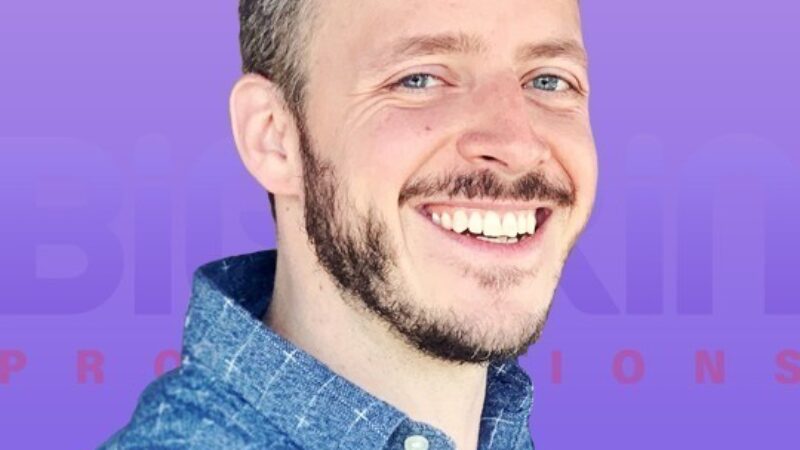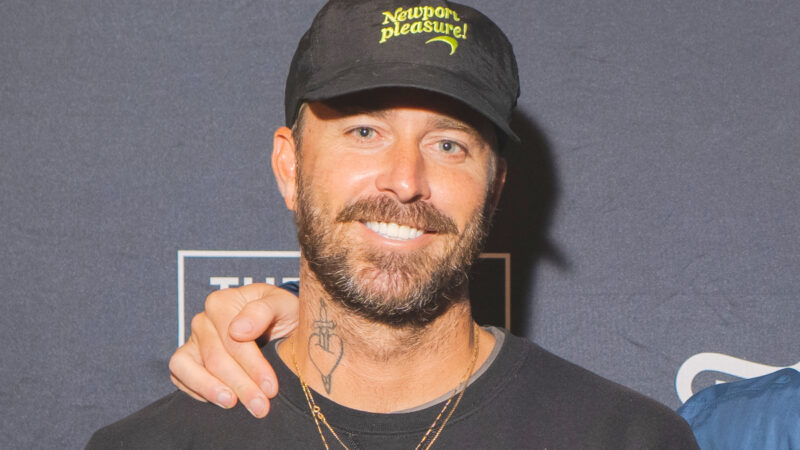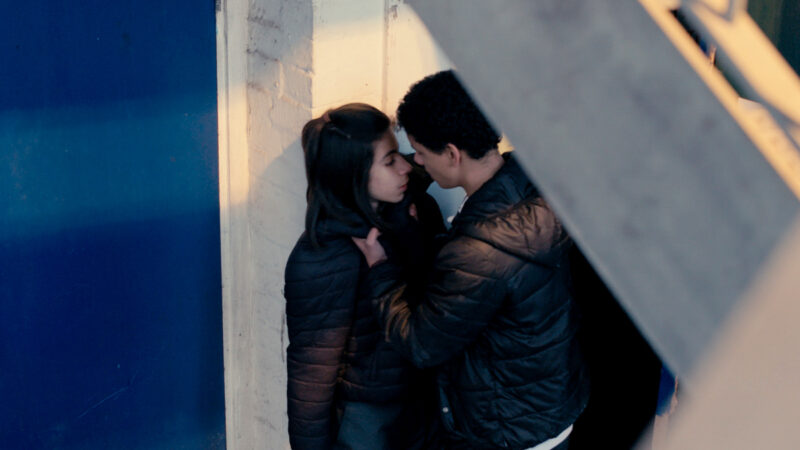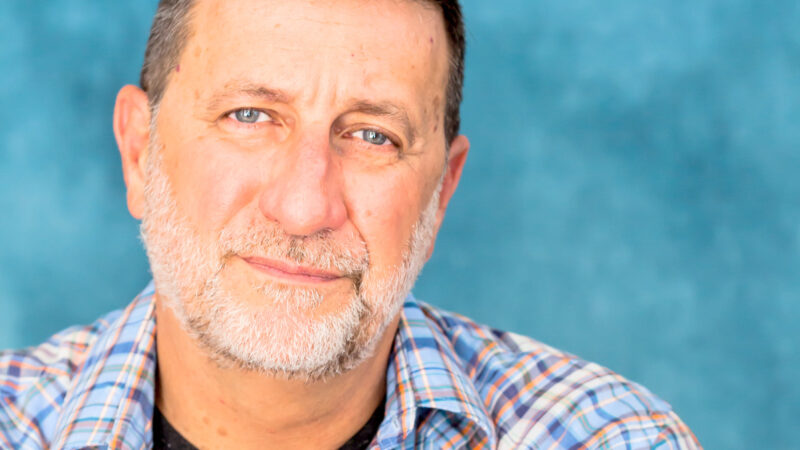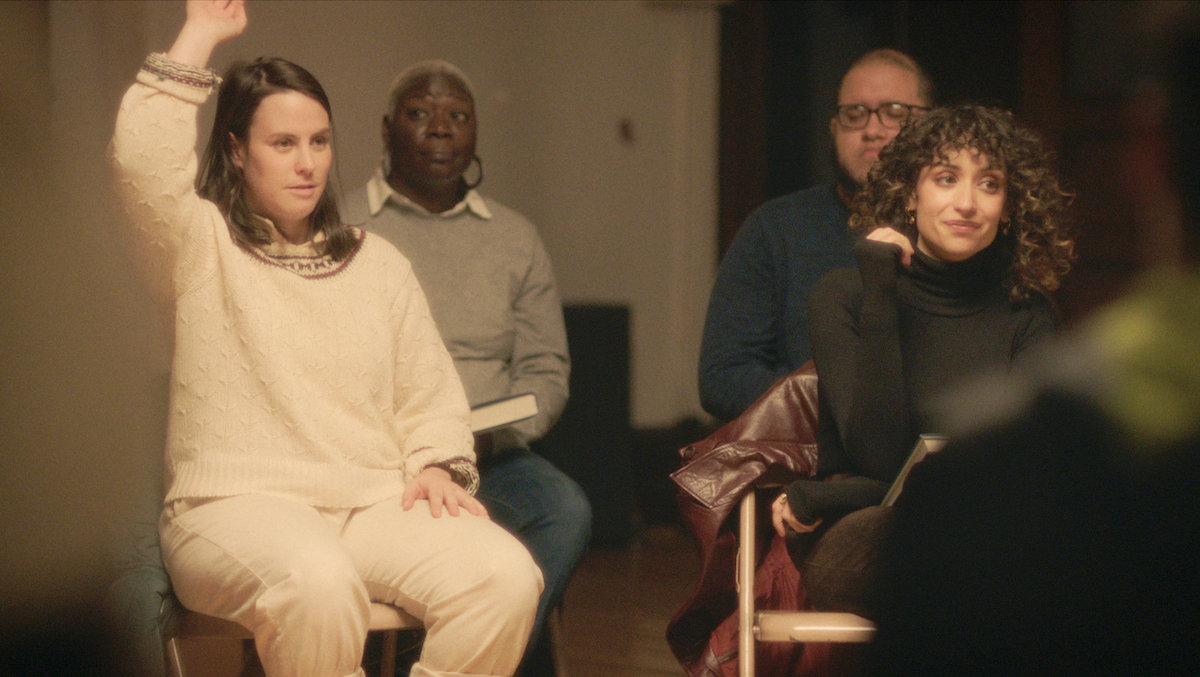
I have a lot of friends and family that have struggled with addiction and/or have gotten sober. As a child, I grew up going to AA meetings with family members. I mean, I really grew up in the rooms. I would take friends with me to have playdates and we would play Barbie in the hallway at the church. So I am intimately familiar with how meetings work. I myself also go to Al-anon, so meetings are still a part of my life. So – I thought the 12-step meeting space was a very rich space – both physically and emotionally – for a short.
It is contained, it is charged, there’s tons of humor and there’s tons of sadness. There’s so much going on in those rooms. And then I paired that with a mother daughter dynamic because those are very interesting to me. I have an incredibly close relationship with my mom, but it is also super complicated and oftentimes challenging. We love each other so much, but we also butt heads. So, I thought combining the meeting space with that relationship would make for some great drama and a very rich story.
indieactivity: Did you start writing with a cast (You or any) in mind?
Olivia Levine (OL): I knew I would play the lead. I wanted to work on a project that could showcase my writing and my acting. So, that was always something I knew about the project! Otherwise, I didn’t write with certain folks in mind. But, the cast we pulled together was simply perfect for the project. I feel so grateful.
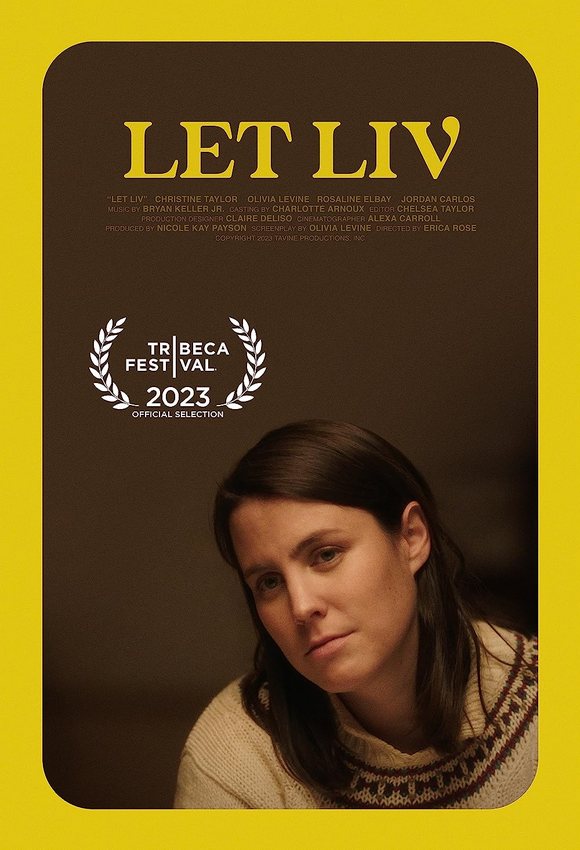
How long did you take to complete the script?
Olivia Levine (OL): I actually started the script in a short film writing class. It lasted maybe six or eight weeks? And from there, I shared it with Erica, and she helped me develop it into what it is now! All in all, it probably took about four to five months to land on something I really loved, that we both really loved. In terms of process, I am still always playing around with what works best. Oftentimes, something in my life – an event, an exchange, a person – will inspire an idea or premise.
From there, I like to build out that premise. I will explore different directions for where the story could go, entertain certain character traits, etc. I actually tend to flesh out some plot points before I delve super deep into character stuff – that said, I usually start with a strong idea of who the protagonist is. Sometimes I will come up with lines of dialogue for characters even before I realize other things about them. Like I will hear something out in the wild or my mind will come up with something. And I am like, OH that character says THIS.
When did you form your production company – and what was the original motivation for its formation?
Olivia Levine (OL): I use Tavine Productions for logistical purposes – it’s a company I formed a while back while producing a play – but I wouldn’t call it a production company. I would say, though, that I do feel like Erica and I are a pretty strong team at this point. Of course we won’t work on everything together – we each have our own things going too – but we are developing the feature version of LET LIV together, and will continue to work on things as a team! We love working together.
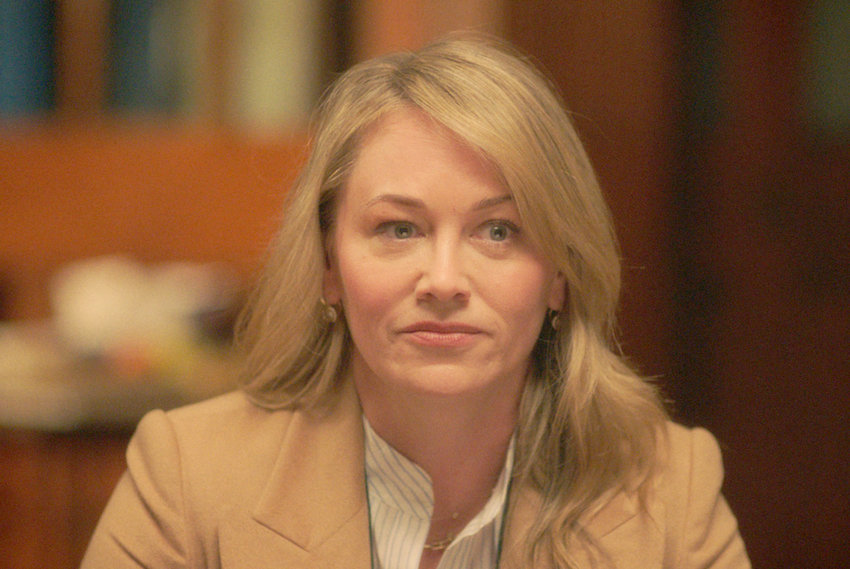
What was the first writing project that you were involved with or that was out of the gate?
Olivia Levine (OL): Oh interesting…I think that could be answered a couple ways, but I will start with my old comedy show, I THINK WE’RE ALONE NOW. I had a comedy duo with my friend Colette McIntyre – truly the funniest human alive – and we would write a scripted show every month. It was actually a lot of work, but it didn’t seem like it at the time because it was so much fun. That was really my first foray into consistently writing.
It helped me realize how important it is to just get your reps in. How much you can improve from just writing, writing, writing. And then after that, I wrote my solo show, which is about the intersection of my OCD and queerness. That was like, my first full length piece that was produced, etc. That was incredibly hard work, but again, I realized how important it is to just put your head down and keep doing the work. That goes a really long way.
During the production of the trailer or proof of concept, what scene (that made the cut) was the hardest to shoot?
Olivia Levine (OL): I am going to interpret this as being about the short itself. The hardest scene to shoot was the opening scene. It was FREEZING outside, and we had to keep smoking these herbal cigarettes over and over again, and the people from the church across the street kept getting mad at us because they could smell the herbal cigarettes from inside. There was just a lot going on and a lot of things to keep in mind during that scene. In the end, I think we got a great take, though!
What works better in this latest production that mightn’t have worked so well in the last one you did?
Olivia Levine (OL): I think that everyone on the crew and in the cast was really committed and really good at communicating, so we had a very smooth production process. I think we were very considerate and specific about who we onboarded, how we treated them, etc. So at the end of the day, even when surprises popped up, we were able to handle them very professionally and smoothly. I can’t say that has always been the case on projects i have worked on!
You wrote and directed the film, what measure of input did it take to don these two hats?
Olivia Levine (OL): I actually wrote and starred, Erica Rose directed it, and did so very well! In terms of being actor and writer, though, it definitely took some compartmentalizing. About a week before the shoot, my other producers started keeping me out of the loop on certain production matter so I could focus on my actor prep. That was helpful. And I just really had to renounce control in terms of like, wanting my words to sound a certain way in other people’s mouths, etc. It required a lot of trust.
Is there anything about the independent filmmaking business you still struggle with?
Olivia Levine (OL): I mean, I am pretty new to the indie film world to be honest, but I would say there are certainly some parallels with the indie theatre world. Money is hard to come by. I spent lots of time and energy fundraising for this project and it was certainly not easy. I do wish that this country, our systems of government, etc. made it easier for indie artists to get projects off the ground without investing their own money and/or spending ample time and energy soliciting money from donors or investors. Other countries have far more resources when it comes to this, and I wish we did in the US too.
Where do you think your strengths line as a filmmaker?
Olivia Levine (OL): I like to think I have a pretty strong ear for dialogue. I think I always have had that. I love people and relationships and listening to people talk about relationships and other things. So I think I have just been LISTENING to people for so long, and I have a decent sense of how they communicate! I also think I balance humor and drama well. I am a comedian, so things always need to have some humor in them for me. I think, tonally, it can be hard to strike a good balance between the two. I definitely have much to learn still, but I do think I have a knack for sensing that balance and what it needs to look like!
Let’s talk finance, How did you finance the film?
Olivia Levine (OL): We financed the film through mostly smaller donations, and a few larger ones. We also received a NYSCA grant. We used Fractured Atlas as our fiscal sponsor, and through them ran a crowdfunding campaign. It was a lot, but we got there!
How much did you go over budget? How did you manage it?
Olivia Levine (OL): We went over by a couple thousand, and we managed that by cutting back in other areas and, in some cases, asking donors for more money.
How important is marketing? Do you think a project can make any dent without it these days?
Olivia Levine (OL): I think in the world of short films, marketing is a sort of weird thing. Most shorts still don’t sell, so if you want folks to see them, you have to get kind of creative. So on one hand, marketing is not huge just because it’s unlikely to begin with that a ton of folks will see your short. But on the other hand, I think if you do a really big push with a short, it can definitely make a huge difference on a sort of small scale level. Also, I am new to this all, so this is really just my perspective based on this single experience!
What do you hope audiences get from your film after you finally make it?
Olivia Levine (OL): I think that I want folks to walk away from the film not knowing totally how to feel about what went down between mother and daughter. I think that, at the heart of the film is this big question about what it means to take care of yourself, and how that comes up against taking care of other people that mean a lot to you. I want folks to really think about what it means to take care of oneself in the context of addiction and codependent relationships.
Tell us about how you intend to make your pitch for the feature to the studios interested?
Olivia Levine (OL): I think we haven’t quite gotten there yet, to be honest! But I think that the short is definitely a great proof of concept and will go a long way in piquing some interest!
Do you have the feature script written? Tell us about it? How do you expand a short into a feature length script?
Olivia Levine (OL): We are in the outlining process at present! In terms of story expansion – we have really been focusing on fleshing out all of the character arcs and relationship arcs. We are also filling in tons of backstory and determining which relationships we wish to explore in more depth. We are also looking more closely at Liv’s specific relationship to addiction and mental health, as well as her work life.
What else have you got in the works?
Olivia Levine (OL): I am developing a feature with Proton Entertainment and have some pilots I am developing! I am also trying to tour my solo show, UNSTUCK: A Solo Show About Growing Up With OCD.
Tell us what you think of the interview with Olivia Levine. What do you think of it? What ideas did you get? Do you have any suggestions? Or did it help you? Let’s have your comments below and/or on Facebook, Instagram, or Twitter.
Socials
Website
IMDb
Facebook
TikTok
Twitter
FILMMAKER INTERVIEWS


